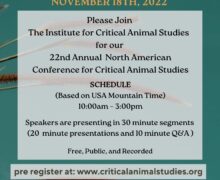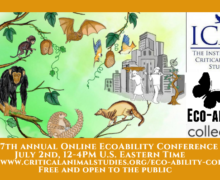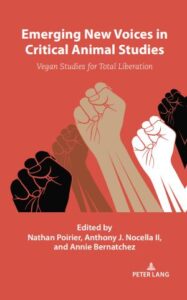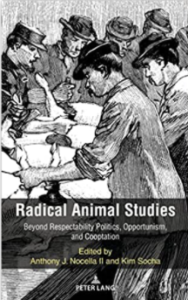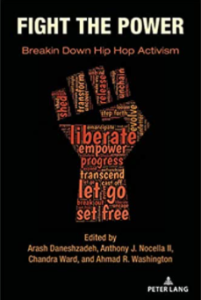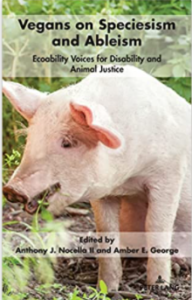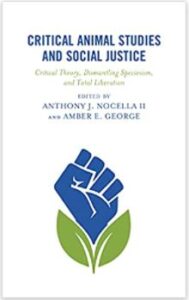8th Annual Students for Critical Animal Studies Conference April 1, 2023
virtual, free, public, recorded.
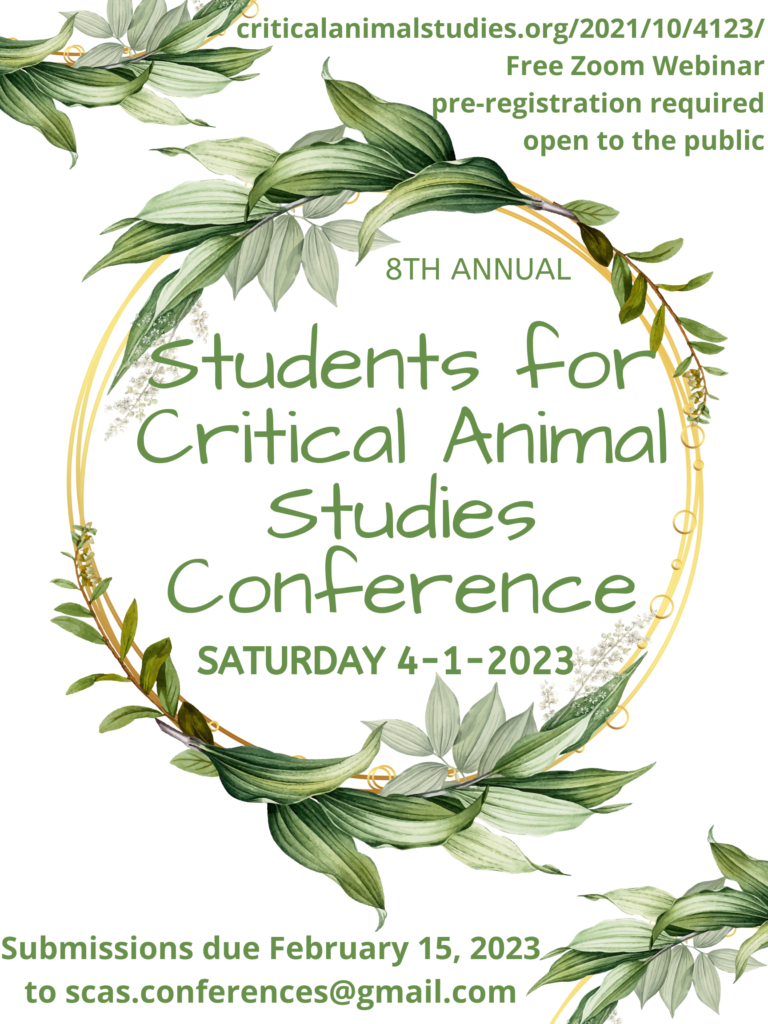
registration required here
All presentations have 20 min with 10 minutes for Q&A
What is SCAS?
The Students for Critical Animal Studies (SCAS), rooted in animal liberation and anarchism, is an international association of students, from high schools, to online colleges, to graduate schools. These students are dedicated to the abolition of animal and ecological exploitation, and to dismantling all systems of oppression in hopes for a just, equitable, inclusive and peaceful world. SCAS Challenges students to view social justice from a more inclusive and intersectional perspective, while providing a forum for the meeting of academia and activism
This 7th annual conference will provide a platform for students, activists, and professors to assess animal liberation, oppression and domination theoretically and empirically. Our hope is that the conference will encourage both a productive reflection that challenges normalcy of systemic oppression and networking among those who do academic and pragmatic social justice work.
Conference Schedule
(based on USA Eastern time)
3-3:30pm Anthropogenic Monsters: A CAS and Liberating Perspective on the Contemporary Production of Human and Nonhuman Monsters
(Agnese Martini, Francesca Corradini, Matteo Porazzi)
Abstract: The human imagination has always been haunted by monsters. In the past, monsters, like angels, used to be messengers of the extraordinary, often with a divine warrant. Can contemporary monsters still transmit such a message? And can the category of monstrosity be relevant for Critical Animal Studies? This essay will explore, through a CAS perspective, the contemporary production of monsters, both human and nonhuman, and the possible liberating message of monsters. In this context, contemporary monsters are referred to as “anthropogenic” because they are materially produced by human activities or ideologically created by human discourses. First, the chapter will look at the “serial” production of monstrous animal bodies through genetic modification, intensive animal farming, and environmental degradation. Then, it will consider the proliferation of human monsters in the cultural imaginary through the discrimination of non-conforming human bodies, such as disabled, Black and trans* bodies. Finally, it will offer a comparison between the human and nonhuman, and propose a liberating perspective starting from the work of some writers and activists – such as Susan Stryker, Paul Preciado and Filo Sottile – who decided to claim back the concept of monstrosity as empowering. By embracing and accepting monstrosity, they also dismantle the separation and hierarchy between human and nonhuman beings. Therefore, monsters can show the unexpected pathways one must follow in order to overcome anthropocentrism and speciesism.
Biographies: Francesca Corradini is a Master’s student in Environmental Humanities at Ca’Foscari University in Venice. She obtained a degree in Cultural Heritage from the University of Trento with a thesis on the role of sounds as a means of interaction with the environment and other non-human species, exploring the role of sound recordings as a way of collecting and preserving memories and traditions. Currently, in her Master’s degree she is focusing on the fields of critical animal studies, indigenous studies, conservation biology, environmental anthropology, and environmental education. In addition, she is now involved in a project on soundscapes, sound maps, and multi-species encounters. Agnese Martini graduated in Philosophy from the University of Bologna with a thesis on the history of madness, focusing on Foucault’s analysis of the oppressive system of asylum and the discrimination generated by the medicalization of mental illness. She is currently enrolled in a Master’s degree in Environmental Humanities at Ca’Foscari University of Venice and her academic interests revolve around Critical Animal Studies, Multispecies Ethnography and Environmental Anthropology. She is also involved in an ethnobiology research project regarding traditional ecological knowledge of fishermen in the Venice Lagoon. Matteo Porazzi is a Master’s student in Environmental Humanities at University Ca’Foscari of Venice. Previously, he graduated in Language and Cultural Mediation from the University of Milan with a thesis that resonated on the ideas of identity, femaleness and blackness of the Nigerian author Chimamanda Ngozi Adichie. Currently, in his M.A.’s program he is focusing more on the field of Critical Animal Studies, Food Studies, and Environmental Sustainability. Alongside his university career, he is working for The New Institute Centre for Environmental Humanities (NICHE) and the European Centre for Living Technology (ECLT).
3:30-4pm The Reproduction of Violence in Resistance to Brahminical Vegetarianism
(Varun Joshi)
Abstract: Non-human animal rights efforts in India face multiple systems of violence, specifically caste-based oppression while working towards animal rights. Hindus who practice vegetarianism link their dietary choice to active justice aligned with contemporary interpretations of Hinduism. However, current state-level Hindu nationalism provides a very narrow form of animal rights that excludes non-Hindus, non-Brahmin Hindus, animals aside from cows, and the environment. Resistance to Brahminical vegetarianism in India manifests as the consumption of cow flesh to show solidarity amongst individuals that experience state-administered violence in the name of animal rights. This paper deconstructs Brahminical vegetarianism as a form of justice given the biophysical harms caused to the environment, people, and animals. However, contemporary resistance to Brahminical vegetarianism associated with the consumption of cows is critically examined to assess how defiance of state-sponsored violence reproduces violence against animals, people, and land.
Bio: Varun Joshi is a PhD Candidate at the University of Guelph and studies life course criminology, who’s dissertation examines the ways in which a Canadian prison slaughterhouse furthers prison as a total institution. Currently, in his proposal writing stage, Varun is a Punjabi Canadian involved in mental health advocacy in the Punjabi community and is a part of the Men’s Mental Health Forum with Soch Mental Health. Varun intends on furthering Green Criminology as a discipline by incorporating experiences in the Indus subcontinent to assess how hierarchies in perceiving animals are created.
4-4:30pm Is Slavery Over? Nope. An Analysis of How Jordan Peele’s film Nope Explores the Linking of Blackness and Animality as a Tool to Maintain White Supremacy
(Erika Carper)
Abstract: This research paper highlights the work of Aph Ko, Val Plumwood, Thomas Nagel, and among the less likely of critical animal studies figures, Jordan Peele. By analyzing the implications of animality and race in Peel’s latest film Nope, this piece is able to explore the ways in which the perceived animality of Black people specifically, is used as a tool to enforce and protect white supremacy. In doing this, the work reveals a need for the equality of all animals in order to see a world without the hauntings of white supremacy actualized. In other words, the piece emphasizes the fact that systemic racism cannot be eradicated without concomitant equal rights for non-human animals. Notions of animality exist as the foundation of nearly every type of oppression, yet are continually dismissed and overlooked by activists of marginalized groups–this piece is a cry for those advocates to pay closer attention to the rights of non-human animals, as a means to gain ground in the fight for things such as racial equality. As Aph Ko says so brilliantly, I am asking them to consider the “anatomy of their oppression.”
Bio: Erika Carper is a senior at Otterbein University, studying English and Education. The field of Critical Animal Studies is new to her, but its sentiments feel very familiar. Is Slavery Over? Nope. is her first of hopefully many Critical Animal Studies research projects, which was predominantly inspired by her investment and love for Aph Ko’s research, as well as Jordan Peele’s latest movie Nope. Additionally, Erika aspires to be an English teacher, writer, non-human animal ally, as well as a part-time, novice opera singer.
4:30-5pm The Place of Veganism in Multispecies Justice
(Darren Chang)
Abstract: Multispecies Justice (MSJ), as an emerging theoretical approach, aims to theorize what the inclusion of more-than-human interests in our justice considerations might require. One group of scholars who have mapped the research terrain for MSJ trace its intellectual and political origins to animal rights, environmental justice and political ecology, posthumanism, as well as Indigenous philosophies and decolonizing justice theories. However, with the exception of animal rights, veganism has not been widely accepted as an integral part of securing justice for animals other than human in any of the other intellectual traditions named – and is, in fact, often critiqued and resisted within them. An example of such resistance could be observed in ecofeminism, where concerns regarding veganism – whether it should be universal, contextual, or even accepted at all – have long been debated. This chapter traces the tensions between veganism and other justice movements and explores ways in which veganism might gain broader acceptance within MSJ and its related theories, beyond animal rights / liberation. I suggest that in the current historical moment, only veganism(s) fully informed by local epistemologies and contexts have a chance to thrive within MSJ and its related frameworks, while hegemonic forms of veganism that align with oppressive powers or present as universal will always be met with resistance. Drawing on examples from various contexts, I examine how the vegan commitment to justice for all animals could be realized beyond western conceptions of animal rights / liberation.
Bio: Darren Chang is a PhD student in the Department of Sociology and Criminology and the Sydney Environment Institute at the University of Sydney. His research interests broadly include interspecies relations under colonialism and global capitalism, practices of solidarity and mutual aid across species in challenging oppressive powers, and social movement theories.
Conference Organizer: Nathan Poirier (Graduate student of sociology at Michigan State University)



